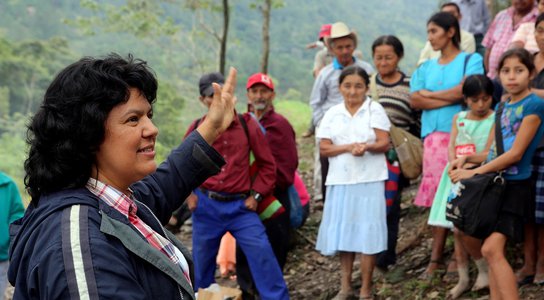Bunge, one of the world’s largest soy traders, is failing to prevent abuses of land rights, human rights and risks to land and environmental defenders
- Global Witness and Friends of the Earth US have briefed shareholders to vote against the board at Bunge’s Annual General Meeting
- The briefing comes as Majority Action US holds Bunge to account for its failure to mitigate the impact of its operations on the climate crisis
- Bunge’s lack of action on climate extends to its approach to sustainability, transparency, and human rights which exposes shareholders to numerous financial, operational, legal, regulatory, and reputational risks.
- Download the full briefing (253.4 KB), pdf
Bunge, one of the world’s largest agribusiness traders, has a business model that both impacts and is impacted by the growing climate crisis. Bunge has not taken sufficient steps to reduce climate risks, demonstrated by its failure to set an adequate Net Zero by 2050 target, to realign its investment plans to limit climate change to 1.5°C, or to align its policy influence activities with responsible climate stewardship. This has led Majority Action US’ decision to file A Notice of Exempt Solicitation with the US Securities and Exchange Commission (SEC).
Whilst the argument presented to the SEC focuses on climate-critical deforestation linked to Bunge’s agricultural supply chains, this joint briefing by Friends of the Earth US and Global Witness expands upon these concerns by examining Bunge’s failure to identify, mitigate and prevent abuses of land rights, human rights and risks to environmental human rights defenders.
Together with Friends of the Earth US we have briefed Bunge’s shareholders to vote against the board ahead of the company’s 2022 Annual General Meeting. The new brief exposes and examines Bunge’s failure to identify, mitigate and prevent abuses of land rights, human rights and risks to environmental human rights defenders.
Research clearly shows that land and environmental defenders play a vital role in protecting climate-critical forests and ecosystems. Indigenous-managed lands have lower deforestation rates and better conservation outcomes than protection zones that exclude indigenous peoples. We believe protecting land and environmental defenders should therefore be at the forefront of responsible corporate climate stewardship.
Key findings
Further to the detrimental impact on the climate crisis outlined by Majority Action US, our brief uncovers the impact of Bunge’s trading on land rights, human rights and land and environmental defenders:
1. Failure to protect land and environmental defenders
- There are instances when Bunge has not taken action to mitigate, investigate or remedy the impacts of its suppliers’ operations on land and environmental defenders. Global Witness research revealed Bunge is failing to ensure that the hundreds of Indonesian palm oil mills they source from are free from abuse against land and environmental defenders.
- Research also discovered that Bunge is dealing in conflict-tainted soy sourced from soy producers in Bahia State, Brazil. In contributing to land conflict and alleged human rights abuses, Bunge may be in violation of its responsibilities under UN and OECD human rights standards.
2. Failure to tackle deforestation in its supply chain
- Soy presents most of Bunge’s exposure to deforestation. In April 2021, Mighty Earth’s Deforestation Tracker estimated Bunge’s soy supply was linked to almost 60,000 hectares of deforestation in Brazil from March 2019 to March 2021 - with just over 20,000 hectares of that possibly being illegal.
3. Relationship with Big Oil
- To show its commitment to reducing carbon in the energy value chain, Bunge entered into a joint venture in renewable fuels with fossil fuel giant Chevron. However, US Congress published a damning analysis that seriously undermined Chevron’s climate pledges and damaged its credibility as a renewable investor. Furthermore, Chevron is yet to develop a ‘net-zero’ commitment, or a commitment to align its activities with the temperature goals set in the Paris Agreement.
4. Insider lobbying against robust due diligence on deforestation
- Bunge has used its senior position in influential trade associations to lobby the European Union to weaken proposed rules which would ensure Bunge could continue trading commodities produced through deforestation and sell to markets which prohibit it.
Recommendations
The multiple failures highlighted by the briefing expose shareholders to numerous financial, operational, legal, regulatory, and reputational risks. We’re calling for shareholders to vote against the board.
Our brief to shareholders clearly demonstrates Bunge isn’t doing enough to protect people and the planet. Shareholders have the power to push Bunge into making tangible changes that reduce the catastrophic environmental and human impact of its operations. We urge shareholders to ensure Bunge develops transparent and comprehensive policies and practices to mitigate the risks of deforestation and human rights abuses from its supply chains.

